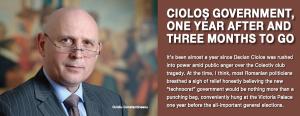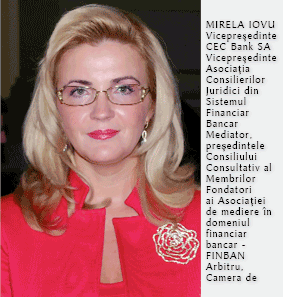Cioloș government, one year after and three months to go
It's been almost a year since Dacian Ciolos was rushed into power amid public anger over the Colectiv club tragedy. At the time, I think, most Romanian politicians breathed a sigh of relief honestly believing the new "echnocrat" government would be nothing more than a punching bag, conveniently hung at the Victoria Palace one year before the all-important general elections.
It is not my intention to analyze its impact on the Romanian political scene or whether Romanians have been charmed by the down-to-earth, diligent and efficient style of Dacian Ciolos. Instead, I will try to look at the impact his government has had on the Romanian economy.
As Liviu Dragnea, the leader of Romania’s largest Social Democrat Party (PSD), summoned Ciolos in front of the Parliament for an almost ritualistic bashing, little did he know that he was in for a big surprise. The Prime Minister delivered an upbeat report on the state of the economy, announcing a higher foreign direct investment volume, lower
unemployment, stable low inflation rate,
higher GDP, a sound and sustainable growth rate, higher wages both in the private and public sectors, better EU funds absorption rate etc., etc. As Mr. Dragnea attempted to deliver the killing blow, the punching bag
retaliated and Mr. Ciolos was able to claim a resounding political victory.
I am not going to build a statue for Mr. Dacian Ciolos yet, but his government’s most important achievement is that it has succeeded in not rocking the fiscal boat, concentrating instead on trimming the Romanian bureaucratic rainforest, by reducing the face-to-face interaction between the bureaucratic apparatus and the business community, cutting the red tape and simplifying the long list of forms and adjacent paperwork a business person has to deal with in order to comply with all the fiscal requirements. The ill-timed and ill-delivered measures put forward by the former Secretary of State, Mr. Gabriel Biris, as well as his way-too-candid opinions were quickly and harshly dealt with, and the celebrated fiscal lawyer was pushed aside. “Read my lips: no more tax”. That may be a good slogan for
Mr. Ciolos if he decided to enter politics, but, as usual, the devil resides in the details.
Indeed, foreign direct investments have gone up nearly 30 per cent to around 2.3 billion Euro, but the number of newly registered foreign-owned companies is going down, signaling that Romania is no longer an attractive destination for foreign investors. In addition, with a net wage increase of 12 per cent on the previous year, the PM didn’t say a word about the dynamics of the productivity. The higher average wages in the public sector in comparison with the private one and a record-braking economic growth based on consumption should ring alarm bells.
Moreover, a rather sluggish increase in exports and high agriculture output due to good weather conditions show that Romania’s manufacturing sectors are trailing behind, and the current government is not doing enough to find a solution. To make things worse, there are signs that certain regions and development poles such as Bucharest, Cluj-Napoca, Timisoara-Arad, Constanta and Sibiu are
moving ahead much faster, making it even more difficult for regions such as Moldavia, Southern Romania and Oltenia to catch-up and prosper, and the usual suspect is the lack of proper infrastructure.
It is obvious that without a proper interconnecting infrastructure, the Romanian economy is not able to develop to its full potential and, probably, the main failure of the Ciolos government is that it has wasted the opportunity to enter the history books as the one that kick-started the strategically important Pitesti-Sibiu motorway (a railway link on the same route would not do any harm either).
Just opening the tender procedures for the feasibility studies for two out of five sectors of the motorway is not good enough. Strategically important companies such as Dacia-Renault, Ford, OMV-Petrom as well as the large freight companies are no longer content with nice plans and doctored road maps that show how the Romanian motorway system may look like in two decades. Their threat to relocate should be taken seriously as the struggle to attract foreign investments will become more and more intense.
I’m also afraid that the latest government initiative meant to boost the workforce market, offering incentives for people to come off the dole and/or relocate may ultimately backfire and bring more people to prosperous areas instead of bringing more investments where they are needed the most, i.e. in the most deprived regions of the country. The initiatives put forward by several members of the government to bring a ray of investment hope in those regions are welcomed, but I do not think they are enough.
Just a quick thought about the fight against corruption, one of the biggest concerns for foreign investors: the Ciolos government performed almost ok.
To conclude, it is too early to say how Dacian Ciolos’s government will go down in history, but I have the gut feeling that come January 2017, we will miss it dearly.
As Liviu Dragnea, the leader of Romania’s largest Social Democrat Party (PSD), summoned Ciolos in front of the Parliament for an almost ritualistic bashing, little did he know that he was in for a big surprise. The Prime Minister delivered an upbeat report on the state of the economy, announcing a higher foreign direct investment volume, lower
unemployment, stable low inflation rate,
higher GDP, a sound and sustainable growth rate, higher wages both in the private and public sectors, better EU funds absorption rate etc., etc. As Mr. Dragnea attempted to deliver the killing blow, the punching bag
retaliated and Mr. Ciolos was able to claim a resounding political victory.
I am not going to build a statue for Mr. Dacian Ciolos yet, but his government’s most important achievement is that it has succeeded in not rocking the fiscal boat, concentrating instead on trimming the Romanian bureaucratic rainforest, by reducing the face-to-face interaction between the bureaucratic apparatus and the business community, cutting the red tape and simplifying the long list of forms and adjacent paperwork a business person has to deal with in order to comply with all the fiscal requirements. The ill-timed and ill-delivered measures put forward by the former Secretary of State, Mr. Gabriel Biris, as well as his way-too-candid opinions were quickly and harshly dealt with, and the celebrated fiscal lawyer was pushed aside. “Read my lips: no more tax”. That may be a good slogan for
Mr. Ciolos if he decided to enter politics, but, as usual, the devil resides in the details.
Indeed, foreign direct investments have gone up nearly 30 per cent to around 2.3 billion Euro, but the number of newly registered foreign-owned companies is going down, signaling that Romania is no longer an attractive destination for foreign investors. In addition, with a net wage increase of 12 per cent on the previous year, the PM didn’t say a word about the dynamics of the productivity. The higher average wages in the public sector in comparison with the private one and a record-braking economic growth based on consumption should ring alarm bells.
Moreover, a rather sluggish increase in exports and high agriculture output due to good weather conditions show that Romania’s manufacturing sectors are trailing behind, and the current government is not doing enough to find a solution. To make things worse, there are signs that certain regions and development poles such as Bucharest, Cluj-Napoca, Timisoara-Arad, Constanta and Sibiu are
moving ahead much faster, making it even more difficult for regions such as Moldavia, Southern Romania and Oltenia to catch-up and prosper, and the usual suspect is the lack of proper infrastructure.
It is obvious that without a proper interconnecting infrastructure, the Romanian economy is not able to develop to its full potential and, probably, the main failure of the Ciolos government is that it has wasted the opportunity to enter the history books as the one that kick-started the strategically important Pitesti-Sibiu motorway (a railway link on the same route would not do any harm either).
Just opening the tender procedures for the feasibility studies for two out of five sectors of the motorway is not good enough. Strategically important companies such as Dacia-Renault, Ford, OMV-Petrom as well as the large freight companies are no longer content with nice plans and doctored road maps that show how the Romanian motorway system may look like in two decades. Their threat to relocate should be taken seriously as the struggle to attract foreign investments will become more and more intense.
I’m also afraid that the latest government initiative meant to boost the workforce market, offering incentives for people to come off the dole and/or relocate may ultimately backfire and bring more people to prosperous areas instead of bringing more investments where they are needed the most, i.e. in the most deprived regions of the country. The initiatives put forward by several members of the government to bring a ray of investment hope in those regions are welcomed, but I do not think they are enough.
Just a quick thought about the fight against corruption, one of the biggest concerns for foreign investors: the Ciolos government performed almost ok.
To conclude, it is too early to say how Dacian Ciolos’s government will go down in history, but I have the gut feeling that come January 2017, we will miss it dearly.
The editorial is also available in our print edition.
S-ar putea să îți placă:
COMENTARII:
Fii tu primul care comenteaza



